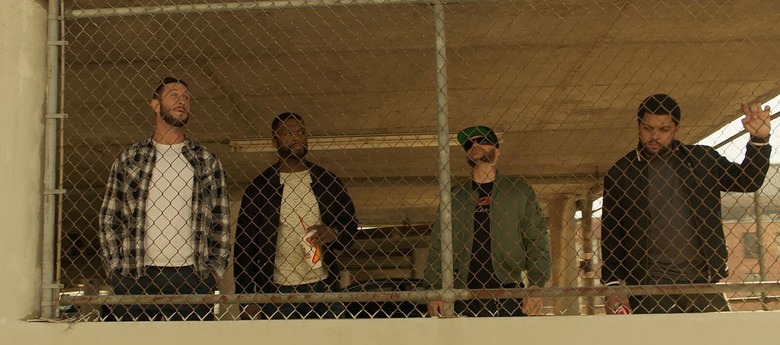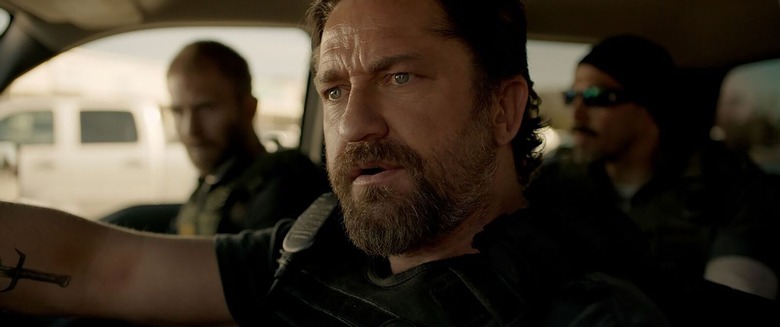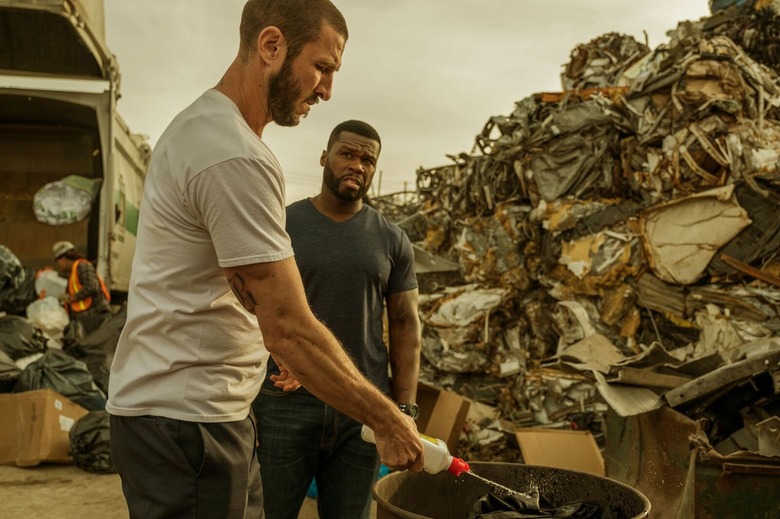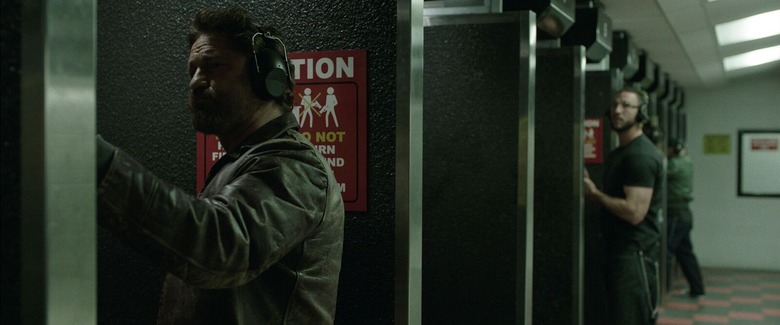'Den Of Thieves' Set Visit: Making The Impossible Kind Of Possible With Curtis Jackson And Gerard Butler
Heading into the Den of Thieves set visit, I was mostly thinking about Curtis "50 Cent" Jackson. While leaving the Den of Thieves set visit, I was still mostly thinking about Curtis "50 Cent" Jackson. The artist, entrepreneur, Vitaminwater moneymaker, and actor was a lot more entertaining and honest than (understandably) some actors tend to be speaking with bloggers on sets. Like most of the cast, he was enjoying himself in Atlanta, Georgia, during a day of filming of the upcoming crime thriller, which stars Gerard Butler as a hulking L.A.P.D cop chasing down a crew of robbers.
Jackson plays Levi Enson, one of the criminals planning to rob the Federal Reserve in Downtown Los Angeles, and as his fine associate Merrimen (American God's Pablo Schreiber) points out in the trailer, the Federal Reserve Bank contains anywhere between $500 to $800 billion dollars at a time. One of the many obstacles facing the team, which also includes O'Shea Jackson Jr. (who was fantastic in Ingrid Goes West) and Evan Jones (8 Miles), is Nick "Big Nick" Flanagan (Butler), "a good guy f***ed up in a lot of dark ways," according to Butler, who has a refreshing and extremely rare sense of humor about some of his movies.
The French Connection, Heat, and The Town (a title dropped more than once on the set) are definitely in the sandbox of writer and first-time director Christian Gudegast (London Has Fallen). Gudegest grew up in Los Angeles around cops, Navy Seals, and LAPD officers, but some of his other friends went down a different path. "What's always interested me with the classic movies with good guys and bad guys, the reality is that's not what it is," Gudegast told us. "It's far more fascinating to me that they're basically the same kind of dude, and the way life worked for them – maybe one grew up without a dad or got in trouble in High School – they just barely go to the other side. The differences that separate them are virtually nothing."
Making the Impossible Kind of Possible
While this is not based on a true story, the filmmaker, who also wrote the ridiculously enjoyable London Has Fallen, did base his story on a real plan that was hatched but never completed. "We had to fill in the blanks," Gudegast explained. "We worked with people at the Federal Reserve and said, 'How do you make the impossible kind of possible?' We made it as real as we possibly could. Could you really do it? Probably not. In the world of movies? Yeah, you can." To make the heist more plausible on-screen, staying close to the truth and the world being depicted was a driving force on the project. Consultants from the military and the LAPD and the former head of the Hell's Angels – and an ATF cop who took on the Hell's Angels – worked on the film to help the director and his stars create a sense of authenticity.
While Gudegast was inspired by To Live and Die in LA, Heat, Jackie Brown, and Un prophète, he was more interested in the reality than how the genre paints it. From the tattoos the cops have to the cars they drive to the clothes and even shoes they wear, he wanted to get everything right. "I love Heat, it's an incredible film, but the world of Heat doesn't exist," he claimed. "It's very stylized. This is the real world. The Chicano experience was covered with End of Watch, Training Day, and the black experience was covered with Boyz n the Hood, Menace II Society, and Straight Outta Compton. But that part of the world – the mix of everything – has not really been covered accurately. That's what we're going to do here." For Gudegast, the shoot was about "authenticity all day long," because the "truth is not only stranger than fiction, it's much more fascinating than fiction."
No Glitz and Glamour
One of the highlights of the visit was speaking with a retired undercover operative, Jay Dobyns, whose crew was an inspiration for Big Nick and his team. "From my experience, the reality of it is not sexy, not glamorous," he told us. "It's a nasty, dirty, grimy, bloody, vomit-covered scab of a life. When I went into it, I thought it was Miami Vice, but I realized quickly it was nothing like that." During his 27 years on the job, he knew "very, very few people who did that job with a Rolex and drove a fancy car," but knew characters like Big Nick's crew "on the hustle" and "pushing the limits of everything they do."
Dobyns helped run the show for two separate boot camps, one for the criminals and one for the cops. As Gudegast said, sometimes the two opposite sides of the law share something in common, but according to the consultant, that's a part of what makes some cops stay ahead. "I think the best plainclothes cops and undercover cops were walking a fence at one point in their lives and could've fallen on the bad guy side of the fence but fell on the good guy side of the fence," he said. "Those guys are so good, because they understand the mentality of the adversary, think like bad guys, and anticipate like bad guys. You see that with these guys, with our characters." With these characters, he wants them to be instantly recognizable to those who've lived this life, so they can see the movie and go, "'That's how we look, that's how we talked, that's how we acted.'" If that's how members of law enforcement respond to the movie, then Dobyns will know he did his job.
The consultant – who's worked everything from hand-to-hand street narcotic transactions to infiltrating crime syndicates and more – knows the frustration of watching phony depictions of the force. "We look at films and go, 'They didn't get that right,'" he said. "We're trying to eliminate that as much as possible. It's still a movie, and we still need to make it entertaining....I told these actors, 'You guys make more money working on a film in two months than I make in 20 years, doing the job for real. Here's the difference: I don't get to repeat a line. When I'm working undercover, I have to get it right the first time. I don't get a second take. If I f*** up my line, I'm going to get a baseball bat on the back of my head. And the people I'm dealing with, they're holding real guns with real bullets...You don't get to get shot 20 times. I've been shot on the job. You get shot one time, that's all you need to know, that's all you need to go through to realize this sucks, this is bullshit, and I don't like this." As for the other side of the law, he also wanted the same level of accuracy with characters who have their "PhDs in violence, intimidation, and crime."
Curtis "50 Cent" Jackson on the 360 Deal, Music, Face Tattoos, and a Lot More
50 Cent's character, who's handy with explosives, went from the life of a college football player to joining the military, serving seven years in prison, and becoming a member of Merrimen's crew. "He really lost his f***ing mind in the joint," he said, before breaking down the little we saw filmed on set that day: the crew entering a bank for another robbery, which is one of the seven the crew pull off before hitting the Federal Reserve.
The actor and musician was unfiltered in a way few actors are. He spent time talking about the music industry, most memorably the 360 deal, which is what gives record companies a big piece of touring, merchandising, endorsements, and more. In a nutshell, it's more ways to take advantage of an artist. "I'm responsible for the 360 deal," he said. "I came in and made a lot of money, but away from the music, it makes the record company go, 'So we split this money to blow him up, and then he makes all this money and we don't get a piece of it? F*** that. Won't happen again.' They didn't develop companies that make your brand extensions opportunities happen. They developed 360 to protect them from watching the artist with money they're not a part of, and that came right after Vitaminwater." The actor discussed the music industry almost as much as his upcoming film, and even shared a view of the difference between two of his jobs:
Know what the difference is between a film artist and music artist is? A film artist has this weird, sophisticated, artistic presentation they may offer at points, like when they're in promotion mode, it makes you uncertain if you like the motherf***er. They're so far from the guy they were in the movie, but if they give you any of those charismatic moments you saw in the film, they feel like they actually are that guy, so they do something else. It's interesting.
During the time we spoke with Jackson – who talked to us twice – he discussed a wide-range of tops, all of which clearly had us all interested. Here are the greatest hits of some of my favorite quotes from our conversation with him:
Putting some of these quotes down doesn't quite do 50 Cent justice because his timing and delivery in-person are so sharp he'd leave any of you wanting to see him in a good comedy. After Den of Thieves, I'm hoping he does more of them; his charisma could accomplish wonders in a comedy.
Gerard Butter Becomes Big Nick
Towards the end of the day, when a lot of actors are tired and ready to go home, Butler was in a jovial mood discussing his experience. "I kind of don't want this one to end," he said, with a month left to go. "When a movie goes well, it's great for the moment, but you know that means the next ones are going to suck a bit more." It was a long time coming for him to play Big Nick; he's been attached to the project for over five years. The actor was immediately drawn to the grittiness of the script, the characters' moral codes, and the unpredictability of a character who he called crazier than his adversaries.
When Big Nick first shows up in the movie at the scene of a crime, the family man is coming off of three long hard days of partying. In the script, there was a description that struck a chord with Butler: "You see he's a hard-charging wildman, but he's a hard charger at everything he does." On the set, Butler looked the part. In addition to studying personality and procedure with LAPD and undercover cops, he packed on 30 pounds that make him earn the name Big Nick – a man you wouldn't want to see coming at you in a hard-charging mode. The character took him further away from himself, which he said allowed him to jump into the skin of a character more easily.
Butler, too, listed The Town and Heat as inspirations – but there's one particular performance that was on his mind. "The biggest one for me is The French Connection," he said. "Gene Hackman...that wildness, that unpredictability is so f***ing...god, in every movie, how can you infuse that much personality and danger into every character he plays?" His face lit up when talking about Hackman, by the way, clearly being a big fan like everyone else of the towering, one-of-a-kind actor. Butler's presence on set didn't look so different from Popeye Doyle. When he first walked over to the group, he looked like a Gerard Butler we haven't seen in a movie before. Again, he didn't look like a man you'd want to see coming after you.
Butler spent a good amount of time immersing himself in the world of Den of Thieves, and he showed a real hunger for attention-to-detail. While he claimed he's terrible at breaking down the plots of his movies, he didn't do a bad job describing what he thinks the story of his upcoming movie is really about."I think one of the fascinating things is, even though I think the movie can survive alone as a heist movie, if you were to ask Christian what the movie is about, he'd say it's about two families," he concluded. "That I think is a great idea, because you really do get to know these two families. They easily could've swapped over. I could've been a part of theirs, and they could've been a part of mine, and there's definitely a mutual respect between these two armies coming together. With their separate codes, sometimes the bad guys have more honor than the good guys." We can all name the obvious classic movies we've seen explore that idea, but if Den of Thieves is as authentic of an experience as all involved were reaching for, maybe it'll bring more to the table than another routine game of cops and robbers.
***
Den of Thieves opens in theaters January 19.




